
No matter who your favorite TV soap villainess might be, she could learn a thing or two from the selfish, conniving, ruthless monster created way back in 1931 by Elizabeth McFadden for her suspense melodrama Double Door, now deliciously revived for a 21st-century audience at Beverly Hills’ Theatre 40.
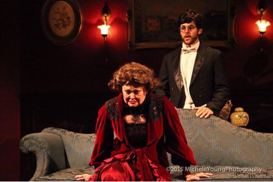 Not that Victoria Van Bret (Rhonda Lord) doesn’t have good reason for her malevolent ways. After all, what 50something millionairess in charge of the family fortune would want her young half-brother marrying beneath his social class, not in the year 1910 and certainly not to a nurse. I mean really, what kind of woman would need to work to earn a living?
Not that Victoria Van Bret (Rhonda Lord) doesn’t have good reason for her malevolent ways. After all, what 50something millionairess in charge of the family fortune would want her young half-brother marrying beneath his social class, not in the year 1910 and certainly not to a nurse. I mean really, what kind of woman would need to work to earn a living?
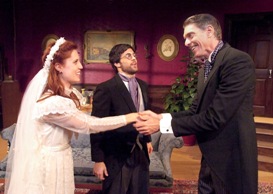 And so Vicky, having already cowed her sister Caroline (Diana Angelina) into submission lo these many decades, now makes it her business to insure that young Rip Van Bret (Ben Theobald) will live to regret the day he tied the knot with Anne (Annalee Scott), the woman who nursed him back to health, even if that means disinheriting Rip and then convincing him that Anne’s clandestine meetings with her onetime sweetheart Dr. John Sully (Christopher Franciosa) are no innocent tête-à-têtes.
And so Vicky, having already cowed her sister Caroline (Diana Angelina) into submission lo these many decades, now makes it her business to insure that young Rip Van Bret (Ben Theobald) will live to regret the day he tied the knot with Anne (Annalee Scott), the woman who nursed him back to health, even if that means disinheriting Rip and then convincing him that Anne’s clandestine meetings with her onetime sweetheart Dr. John Sully (Christopher Franciosa) are no innocent tête-à-têtes.
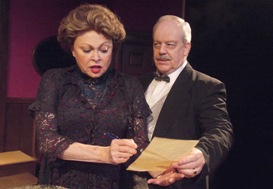 Also figuring in Double Door’s twisted plot are Van Bret family solicitor Neff (David Hunt Stafford), perhaps the only person in Victoria’s entourage willing to stand up to her; housekeeper Avery (Elain Rinehart), maid Louise (Katharine Kimball), and footman William (Richard Carner); Tiffany & Co. employee Chase (Harry Herman), who’s none too pleased when Victoria insists upon taking charge of the family heirloom pearls that Rip plans to have Anne wear on their wedding day; and Pinkerton detective Lambert (Caleb Slaven), Victoria’s secret weapon in her War On Anne.
Also figuring in Double Door’s twisted plot are Van Bret family solicitor Neff (David Hunt Stafford), perhaps the only person in Victoria’s entourage willing to stand up to her; housekeeper Avery (Elain Rinehart), maid Louise (Katharine Kimball), and footman William (Richard Carner); Tiffany & Co. employee Chase (Harry Herman), who’s none too pleased when Victoria insists upon taking charge of the family heirloom pearls that Rip plans to have Anne wear on their wedding day; and Pinkerton detective Lambert (Caleb Slaven), Victoria’s secret weapon in her War On Anne.
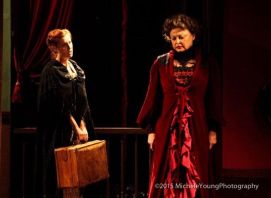 Did I mention that the Van Bret mansion features a windowless sound-proof room that no one knows about but Victoria and Caroline, a hidden chamber whose mention early on (a young Victoria once locked her sister in it for a full 24 hours) may not be a red herring?
Did I mention that the Van Bret mansion features a windowless sound-proof room that no one knows about but Victoria and Caroline, a hidden chamber whose mention early on (a young Victoria once locked her sister in it for a full 24 hours) may not be a red herring?
McCadden’s thriller holds up surprisingly well despite its eighty-four years of age thanks to its precise construction, complex characters, and satisfying double-whammy of an ending.
Yes, today’s audiences may chuckle at the over-the-topness of Victoria’s unashamed maliciousness and spite (she actually locks the piano on Rip’s wedding day to insure a music-free ceremony) and at what just might be in store for someone in that locked soundproof room, but the laughter is never directed at the characters or the writing but at the sheer deliciousness of the McFadden’s fiendishly clever script.
No one does period pieces better than Theatre 40, a company with a particular knack for unearthing long forgotten gems like Flare Path, The Voysey Inheritance, Night Watch, Dangerous Corner, and now Double Door, and with Bruce Gray in the director’s chair as he was for all of the above, the cast of eleven is in expert hands indeed.
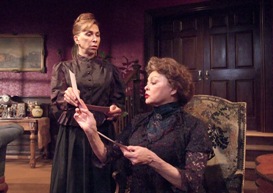 The simply divine Lord pays tribute to the great scenery-chewers of Broadway and Hollywood’s golden age—think Tallulah Bankhead meets Faye Dunaway as Joan Crawford—without ever forgetting that Victoria merely sees her actions as “putting family first.”
The simply divine Lord pays tribute to the great scenery-chewers of Broadway and Hollywood’s golden age—think Tallulah Bankhead meets Faye Dunaway as Joan Crawford—without ever forgetting that Victoria merely sees her actions as “putting family first.”
Theatre 40 favorites Scott and Franciosa and L.A. newcomer Theobald take a more subtle approach, one that adds credibility to even the script’s creakier moments. Scott invests Anne with a combination of loveliness and spunk while Franciosa could not make for a more dashing, sympathetic John. Theobald in particular shines in a performance of subtlety and depth, one that suggests big things ahead for the recent University Of Evansville grad.
Angelina makes our hearts ache for the put-upon Caroline, that is when we don’t want to slap her into action. Stafford’s Neff proves a worthy adversary to the formidable Victoria, and thank goodness for that limp and what it implies.
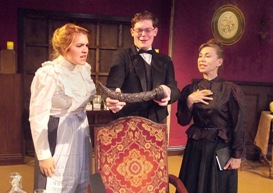 Carner, Kimball, and Rinehart provide able support as a trio of servants who probably wish they were working somewhere else.
Carner, Kimball, and Rinehart provide able support as a trio of servants who probably wish they were working somewhere else.
Last but not least are Herman and Slavin, who take a pair of throw-away roles and make them standout cameos, the former adding some delightful quirks to Chase, the latter giving private eye Lambert a nifty streets-of-New-York edge.
Jeff G. Rack’s terrific Van Bret mansion has an authentic early 20th-century elegance matched by Michèle Young’s gorgeous period costumes. Ric Zimmerman’s expert lighting design enhances Double Door’s suspenseful moods as does Joseph “Sloe” Slawinski’s equally inspired sound design with its 1940s Hollywood thriller-ready orchestral soundtrack and assorted effects. Judi Lewin merits highest marks for her believable wigs and just-right makeup design.
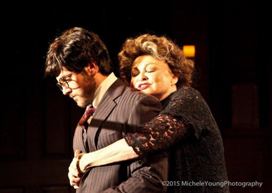 Don Solosan is stage manager and cast member Carner is assistant stage manager. Jean Sportelli is assistant director.
Don Solosan is stage manager and cast member Carner is assistant stage manager. Jean Sportelli is assistant director.
In less accomplished hands, Double Doors might earn its place as a forgotten Broadway chestnut (emphasis on forgotten). With the period pros of Theatre 40 in charge, it earns its gasps, its cheers, and yes, its many laughs as well.
Theatre 40, 241 S. Moreno Dr., Beverly Hills.
www.Theatre40.org
–Steven Stanley
October 12, 2015
Photos: Ed Krieger, Michèle Young



 Since 2007, Steven Stanley's StageSceneLA.com has spotlighted the best in Southern California theater via reviews, interviews, and its annual StageSceneLA Scenies.
Since 2007, Steven Stanley's StageSceneLA.com has spotlighted the best in Southern California theater via reviews, interviews, and its annual StageSceneLA Scenies.







 COPYRIGHT 2025 STEVEN STANLEY :: DESIGN BY
COPYRIGHT 2025 STEVEN STANLEY :: DESIGN BY